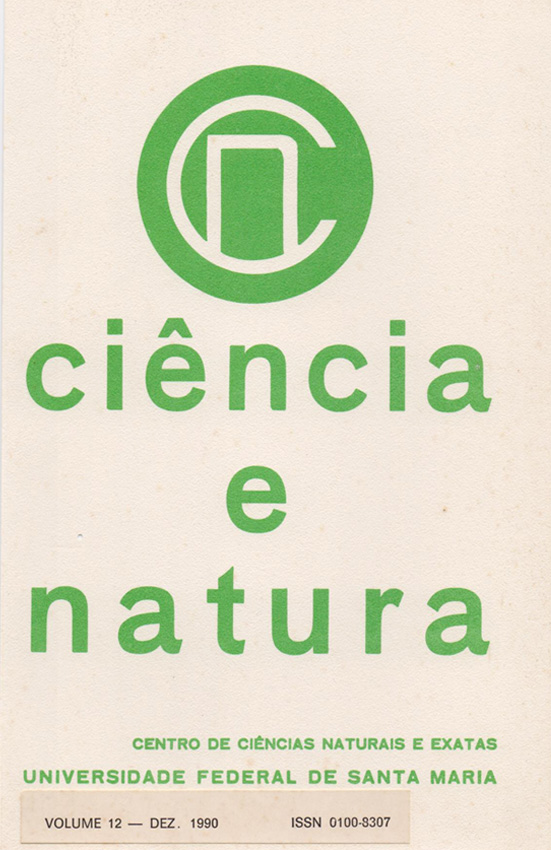A estrutura fundiária do município de Santa Maria
DOI:
https://doi.org/10.5902/2179460X25485Resumo
Os autores enfocam a malha fundiária do município de santa Maria, no Rio Grande do Sul, sob dois aspectos: ligados à posse e à dimensão. Em primeiro momemento, estudam o número de propriedades rurais, considerando um intervalo temporal de 15 anos. Analisam, no período, o comportamento das propriedades por gurpos de área, constando principalmente o aumento significativo do seu número no gurpo com menos de 100 ha e as razões da pulverização fundiária, ao mesmo tempo que buscam causas para explicar a partição de propriedades, de forma generalizada em qualquer dos grupos dimensionais. No segundo momento, buscam através do Coeficiente de Gini, estabelecer o nível de concentração da posse da terra. A concentração forte a muito forte constatada, carece de importância, frente à análise das paisagens por distrito. Fica evidente que, considerando as condições físicas, no atual estágio de desenvolvimento regional, pode ser mais desejável a concentração, a uma pulverização desestimulante e geradora de êxodo rural.
Downloads
Referências
BELÉM, J. História do município de Santa Maria. Porto Alegre, Selbach, 1933.
BERNARDES. S.A.C. Análise da estrutura fundiária do Rio Grande do Sul. In: I Seminário Santamariense de Geografia. 29-33. 1972.
BORTOLUZZI. C.A. Contribuição à geologia da região de Santa Maria. Rio Grande do Sul. Brasil. Pesquisas. Porto Alegre. 4(1): 7-86. 1974.
COHEN. V.R. de A. A Imigração Judaica no Rio Grande do Sul. In:RS: Imigração e Colonização, Série Documenta 4. Porto Alegre. RS. Mercado Aberto. 67-90. 1980.
GERARDI. L.H. de O. & SILVA. B.C.N. Quantificação em Geografia. São Paulo. Difel. 1981.
PAZERA Jr. E. Cadastro fundiário de Salgado de São Félix (PB): Uma abordagem de Geografia Quantitativa. Geonordeste, Aracaju. 2:69 - 73. 1985.
SARTORI. P.L.P.; MACIEL FILHO. C.L. & MENEGOTTO. E. Contribuição ao estudo das rochas vulcânicas da Bacia do Paraná na região de Santa Maria. RS. Rev, Bras. de Geociências, São Paulo, 3 (5):141-159.1975.
Downloads
Publicado
Como Citar
Edição
Seção
Licença
Para acessar a DECLARAÇÃO DE ORIGINALIDADE E EXCLUSIVIDADE E CESSÃO DE DIREITOS AUTORAIS clique aqui.
Diretrizes Éticas para Publicação de Revistas
A revista Ciência e Natura está empenhada em garantir a ética na publicação e na qualidade dos artigos.
A conformidade com padrões de comportamento ético é, portanto, esperada de todas as partes envolvidas: Autores, Editores e Revisores.
Em particular,
Autores: Os Autores devem apresentar uma discussão objetiva sobre a importância do trabalho de pesquisa, bem como detalhes e referências suficientes para permitir que outros reproduzam as experiências. Declarações fraudulentas ou intencionalmente incorretas constituem comportamento antiético e são inaceitáveis. Artigos de Revisão também devem ser objetivos, abrangentes e relatos precisos do estado da arte. Os Autores devem assegurar que seu trabalho é uma obra totalmente original, e se o trabalho e / ou palavras de outros têm sido utilizadas, isso tem sido devidamente reconhecido. O plágio em todas as suas formas constitui um comportamento publicitário não ético e é inaceitável. Submeter o mesmo manuscrito a mais de um jornal simultaneamente constitui um comportamento publicitário não ético e é inaceitável. Os Autores não devem submeter artigos que descrevam essencialmente a mesma pesquisa a mais de uma revista. O Autor correspondente deve garantir que haja um consenso total de todos os Co-autores na aprovação da versão final do artigo e sua submissão para publicação.
Editores: Os Editores devem avaliar manuscritos exclusivamente com base no seu mérito acadêmico. Um Editor não deve usar informações não publicadas na própria pesquisa do Editor sem o consentimento expresso por escrito do Autor. Os Editores devem tomar medidas de resposta razoável quando tiverem sido apresentadas queixas éticas relativas a um manuscrito submetido ou publicado.
Revisores: Todos os manuscritos recebidos para revisão devem ser tratados como documentos confidenciais. As informações ou ideias privilegiadas obtidas através da análise por pares devem ser mantidas confidenciais e não utilizadas para vantagens pessoais. As revisões devem ser conduzidas objetivamente e as observações devem ser formuladas claramente com argumentos de apoio, de modo que os Autores possam usá-los para melhorar o artigo. Qualquer Revisor selecionado que se sinta desqualificado para rever a pesquisa relatada em um manuscrito ou sabe que sua rápida revisão será impossível deve notificar o Editor e desculpar-se do processo de revisão. Os Revisores não devem considerar manuscritos nos quais tenham conflitos de interesse resultantes de relacionamentos ou conexões competitivas, colaborativas ou outras conexões com qualquer dos autores, empresas ou instituições conectadas aos documentos.






